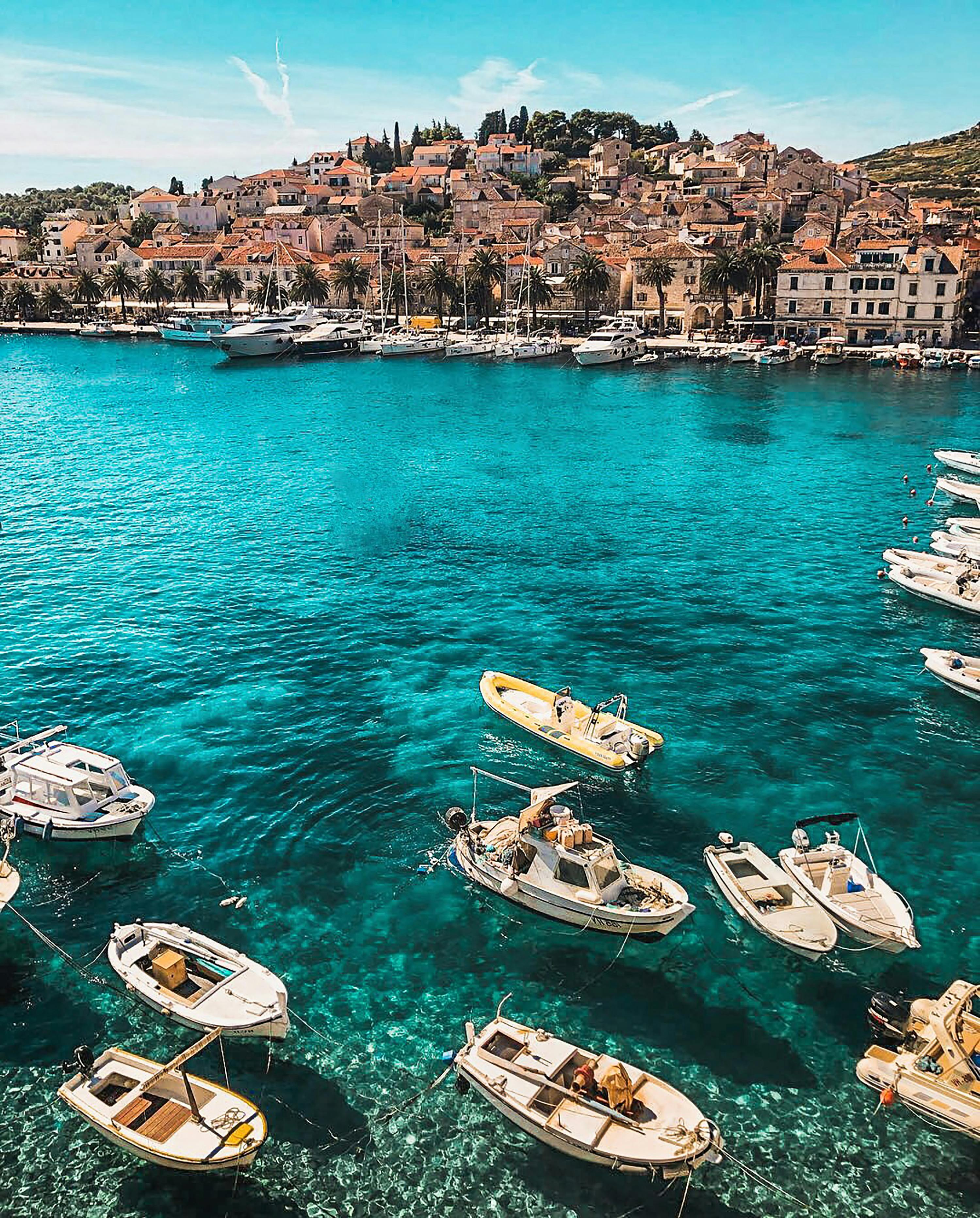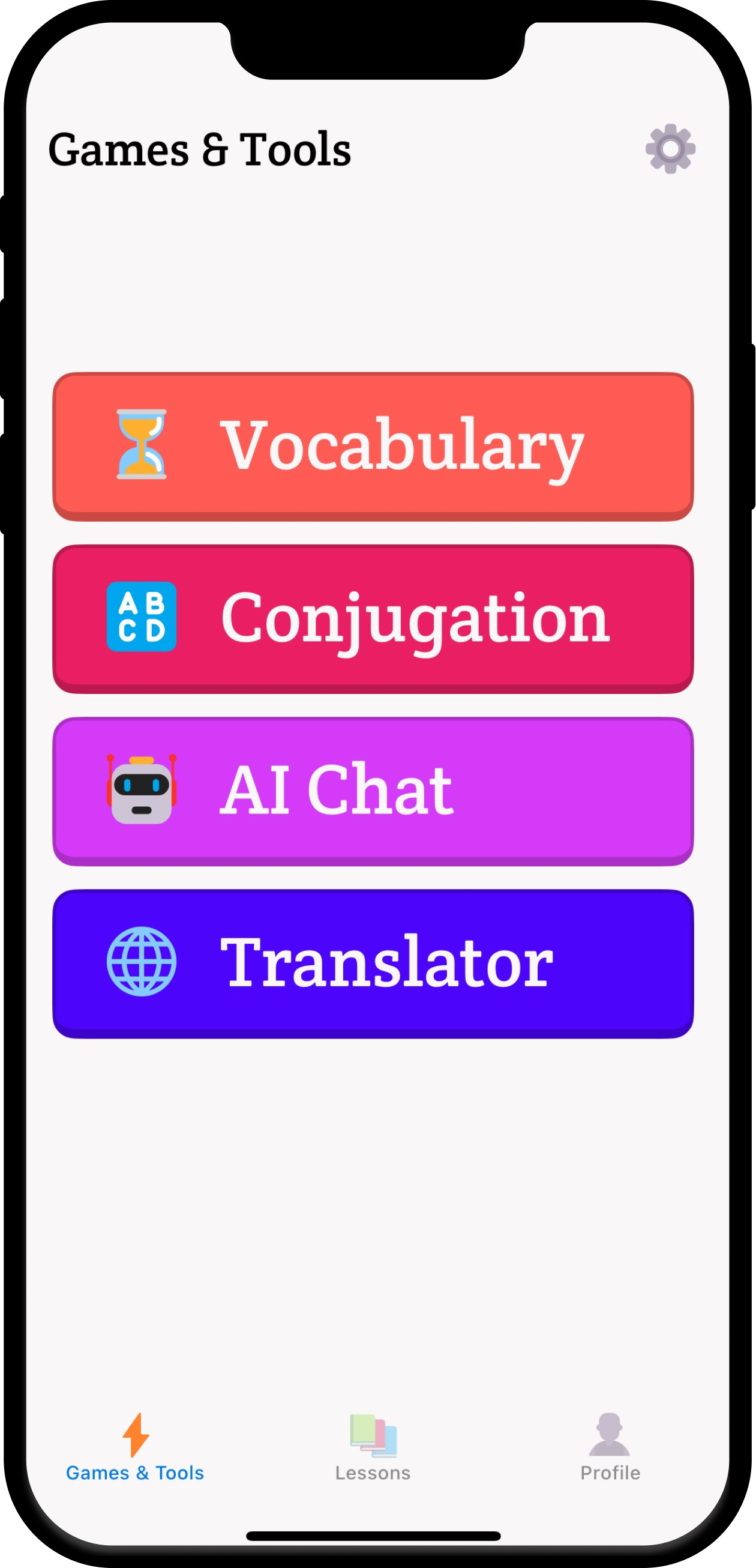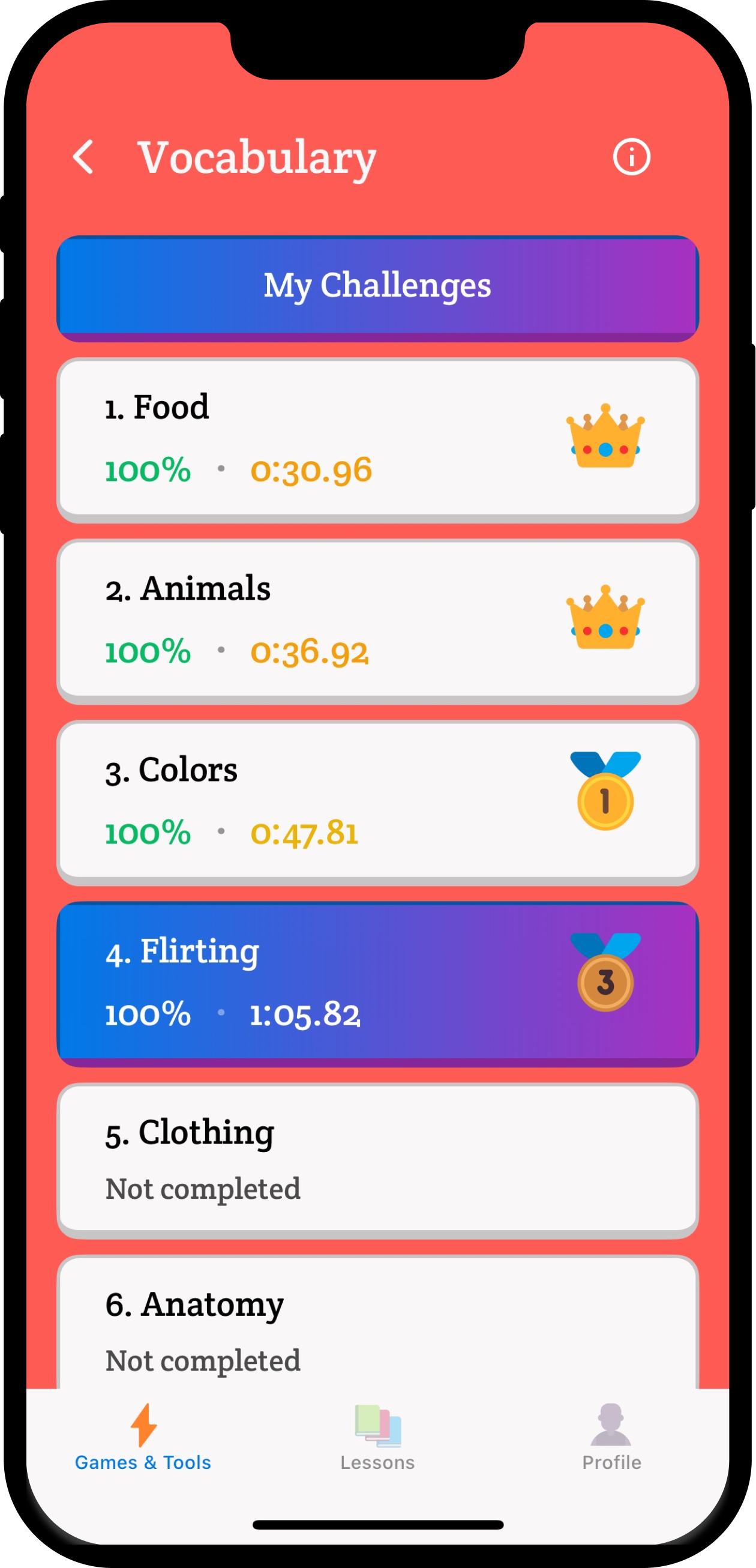100+ Croatian Slang Words and Expressions You Need to Know

Table of Contents
- Common Everyday Slang
- Youth & Modern Slang
- Expressions & Idioms
- Food & Drink Related
- Social & Friendly Terms
- Work & Money Related
- Informal Exclamations
- Regional Variations
- Vulgar Slang
- Love & Relationships
Ready to Learn More?
Try PolyChat's interactive language learning games and put your new vocabulary to the test!

Games & Tools
Essential tools for every learner

Timed Challenges
Practice vocabulary & conjugation

Interactive Games
Learn through engaging gameplay
Understanding Croatian slang is essential for anyone wanting to connect authentically with Croatian speakers and understand the vibrant culture of Croatia. While standard Croatian is taught in schools, everyday conversations are filled with colorful expressions, regional variations, and modern slang that reflect the country's rich history and contemporary life. This comprehensive guide introduces you to 100+ essential Croatian slang words and expressions that will help you sound more natural and understand Croatian culture.
Common Everyday Slang
- Stari: Old man, dude (informal address). Ej stari, kako si? (Hey dude, how are you?)
- Frend/Frendica: Friend (from English). Moj najbolji frend. (My best friend.)
- Lik/Likuša: Guy/girl, dude/chick. Taj lik je čudan. (That guy is weird.)
- Tip/Tipa: Guy/girl. Tipa je zgodna. (The girl is hot.)
- Klinac/Klinka: Kid, young person. Klinac je pametan. (The kid is smart.)
- Cool: Cool (borrowed from English). Baš je cool! (It's really cool!)
- Super: Super, great. Super ideja! (Great idea!)
- Odličan: Excellent, awesome. Odličan film! (Awesome movie!)
- Kul: Cool (from English "cool"). To je kul. (That's cool.)
- Top: Top, excellent. Top si! (You're excellent!)
- Lova: Money. Nemam love. (I don't have money.)
- Para: Money (from Turkish). Treba mi para. (I need money.)
- Kuća: House, home. Idemo kući. (Let's go home.)
- Kola: Car. Kola su mi se pokvarila. (My car broke down.)
- Posao: Work, job. Idem na posao. (I'm going to work.)
- Stvar: Thing, stuff. Kakva je to stvar? (What is that thing?)
- Obitelj: Family. Moja obitelj je velika. (My family is big.)
- Ljudi: People. Puno ljudi ovdje. (Many people here.)
- Gotovo: Done, finished. Gotovo je! (It's done!)
- Ajde: Come on, let's go. Ajde brže! (Come on, faster!)
Youth & Modern Slang
- Bok: Hi, bye (very common). Bok, kako si? (Hi, how are you?)
- Ćao: Bye (from Italian "ciao"). Ćao, vidimo se! (Bye, see you!)
- Zdravo: Hello. Zdravo svima! (Hello everyone!)
- Šta ima: What's up. Šta ima, brate? (What's up, bro?)
- Kako si: How are you. Kako si danas? (How are you today?)
- Dobro sam: I'm good. Dobro sam, hvala. (I'm good, thanks.)
- Sve pet: Everything's great (literally "all five"). Kako je bilo? Sve pet! (How was it? Everything's great!)
- Faca: Face, person. Nova faca u školi. (New face at school.)
- Čovjek: Man, person. Dobar čovjek. (Good person.)
- Baja: Guy, dude. Taj baja je ok. (That guy is okay.)
- Riba: Fish, girl (can be objectifying). Kakva riba! (What a girl!)
- Cura: Girl, girlfriend. Moja cura. (My girlfriend.)
- Dečko: Boy, boyfriend. Moj dečko. (My boyfriend.)
- Ekipa: Crew, gang. Naša ekipa. (Our crew.)
Expressions & Idioms
- Nema problema: No problem. Nema problema, riješit ću to. (No problem, I'll solve it.)
- Bez veze: Pointless, lame (literally "without connection"). To je bez veze. (That's lame.)
- Ma daj: Come on, no way. Ma daj, ne možeš biti ozbiljan. (Come on, you can't be serious.)
- Što da ti kažem: What can I tell you. Što da ti kažem, tako je. (What can I tell you, that's how it is.)
- Nema šanse: No chance. Nema šanse da ću to napraviti. (No chance I'll do that.)
- Sve u redu: Everything's okay. Sve u redu, ne brini. (Everything's okay, don't worry.)
- Baš me briga: I don't care. Baš me briga što misle. (I don't care what they think.)
- Nije mi jasno: I don't understand. Nije mi jasno što govoriš. (I don't understand what you're saying.)
- Sigurno: Sure, certainly. Sigurno ću doći. (I'll certainly come.)
- Možda: Maybe. Možda sutra. (Maybe tomorrow.)
- Uopće ne: Not at all. Uopće mi se ne sviđa. (I don't like it at all.)
- Baš tako: Exactly. Baš tako! (Exactly!)
- Hajde da vidimo: Let's see. Hajde da vidimo što će biti. (Let's see what happens.)
Food & Drink Related
- Hrana: Food. Hrana je odlična. (The food is excellent.)
- Kruh: Bread. Kupujem kruh u pekari. (I'm buying bread at the bakery.)
- Kava: Coffee. Hoću kavu, molim. (I want coffee, please.)
- Čaj: Tea. Čaj s mlijekom. (Tea with milk.)
- Pivo: Beer. Idemo na pivo. (Let's go for a beer.)
- Vino: Wine. Crno vino je dobro. (Red wine is good.)
- Rakija: Traditional Balkan brandy. Rakija od šljive. (Plum brandy.)
- Burek: Traditional pastry. Burek sa sirom. (Cheese burek.)
- Ćevapi: Grilled meat. Ćevapi s lukom. (Ćevapi with onions.)
- Sarma: Stuffed cabbage. Babina sarma je najbolja. (Grandma's sarma is the best.)
- Pašticada: Traditional Dalmatian dish. Pašticada s njokima. (Pašticada with gnocchi.)
- Fritule: Traditional Croatian donuts. Fritule za desert. (Fritule for dessert.)
Social & Friendly Terms
- Prijatelj/Prijateljica: Friend. Moj najbolji prijatelj. (My best friend.)
- Drugar/Drugarica: Friend, buddy. Stari drugar iz škole. (Old buddy from school.)
- Susjed/Susjeda: Neighbor. Susjed je vrlo ljubazan. (The neighbor is very kind.)
- Rođak/Rođakinja: Relative, cousin. Moj rođak živi u Zagrebu. (My cousin lives in Zagreb.)
- Brat/Sestra: Brother/sister. Moj stariji brat. (My older brother.)
- Familija: Family. Velika familija. (Big family.)
- Narod: People, nation. Naš narod. (Our people.)
- Grupa: Group. Naša grupa prijatelja. (Our group of friends.)
- Tim: Team. Naš tim je najbolji. (Our team is the best.)
- Banda: Gang, crew. Cijela banda. (The whole gang.)
Work & Money Related
- Posao: Work, job. Imam novi posao. (I have a new job.)
- Ured: Office. Radim u uredu. (I work in an office.)
- Šef: Boss. Šef je strog. (The boss is strict.)
- Kolega/Kolegica: Colleague. Moji kolegi su simpatični. (My colleagues are nice.)
- Plaća: Salary. Plaća mi nije velika. (My salary is not big.)
- Novac: Money. Trebam novac. (I need money.)
- Kuna: Croatian currency (former). Koštalo je 100 kuna. (It cost 100 kuna.)
- Euro: Euro. Sada plaćamo eurima. (Now we pay with euros.)
- Firma: Company. Radim u velikoj firmi. (I work at a big company.)
- Biznis: Business. Imam mali biznis. (I have a small business.)
- Raspored: Schedule. Moj raspored je fleksibilan. (My schedule is flexible.)
- Godišnji: Vacation. Idem na godišnji. (I'm going on vacation.)
Informal Exclamations
- Bože: God (exclamation). Bože, kako je velik! (God, how big it is!)
- Majko moja: My mother (exclamation). Majko moja, što se dogodilo? (My mother, what happened?)
- Jao: Oh no, ouch. Jao, boli me! (Oh no, it hurts!)
- Evo: Here, there. Evo ga! (There he is!)
- Eto: There, well. Eto, tako je. (There, that's how it is.)
- Ma: Well, but. Ma ne, ne može biti. (Well no, it can't be.)
- Pa: Well, so. Pa ne znam što reći. (Well, I don't know what to say.)
- Uf: Ugh, phew. Uf, kako sam umoran! (Ugh, how tired I am!)
- Eh: Eh, well. Eh, što ću. (Eh, what can I do.)
- Hm: Hmm. Hm, možda. (Hmm, maybe.)
Regional Variations
Zagreb (Northern Croatia)
- Kaj: What (Kajkavian dialect). Kaj radiš? (What are you doing?)
- Doma: At home (Kajkavian). Idem doma. (I'm going home.)
- Frajla: Miss, young lady (from German). Mlada frajla. (Young lady.)
Split (Dalmatia)
- Ča: What (Chakavian dialect). Ča je to? (What is that?)
- Doma: At home (Dalmatian). Smo doma. (We're at home.)
- Pičin dim: Fog (literally "pussy's smoke" - very local). Ima pičin dim. (There's fog.)
Rijeka (Istria)
- Bondi: Good (from Venetian). Bondi, kako si? (Good, how are you?)
- Ciao: Bye (Italian influence). Ciao, čujemo se. (Bye, we'll talk.)
Eastern Croatia (Slavonia)
- Brate: Brother (vocative). Ej brate, dođi ovamo. (Hey brother, come here.)
- Đe: Where (regional). Đe ideš? (Where are you going?)
Vulgar Slang
- Sranje: Shit, crap. Ovo je sranje. (This is shit.)
- Govno: Shit. Puno govana. (Full of shit.)
- Kurac: Dick (very vulgar). Kurac te boli. (Dick hurts you - meaning "you don't care")
- Pička: Cunt (very vulgar). Pička ti materina! (Your mother's cunt!)
- Jebem ti: I fck your (very vulgar). Jebem ti sve! (I fck everything of yours!)
- Đubre: Garbage, asshole. Ti si đubre. (You're garbage.)
- Idiot: Idiot. Ne budi idiot. (Don't be an idiot.)
- Debil: Moron. Pravi debil. (Real moron.)
- Kreten: Cretin. Kakav kreten. (What a cretin.)
- Pizda: Cunt (very vulgar). Pizda materina! (Mother's cunt!)
Love & Relationships
- Ljubav: Love. Ti si moja ljubav. (You're my love.)
- Dragi/Draga: Dear, beloved. Moj dragi. (My dear.)
- Volim te: I love you. Volim te puno. (I love you a lot.)
- Srce: Heart (term of endearment). Moje srce. (My heart.)
- Dušo: Soul (term of endearment). Dušo moja. (My soul.)
- Život: Life (term of endearment). Život moj. (My life.)
- Lijep/Lijepa: Beautiful. Vrlo si lijepa. (You're very beautiful.)
- Sladak/Slatka: Sweet, cute. Slatka si. (You're sweet.)
- Poljubac: Kiss. Daj mi poljubac. (Give me a kiss.)
- Zagrljaj: Hug. Trebam zagrljaj. (I need a hug.)
- Oženjen/Udana: Married. Oženjen sam. (I'm married.)
- Zaručen/Zaručena: Engaged. Zaručeni smo. (We're engaged.)
- Slobodan/Slobodna: Single, free. Slobodan sam. (I'm single.)
Gaming & Internet Culture
- Igra: Game. Ova igra je super. (This game is super.)
- Gamer: Gamer (borrowed from English). Ja sam gamer. (I'm a gamer.)
- Level: Level (borrowed from English). Koji level imaš? (What level do you have?)
- Boss: Boss (game boss). Finalni boss je težak. (The final boss is hard.)
- Lag: Lag (connection issues). Imam loš lag. (I have bad lag.)
- Ping: Ping (internet latency). Ping je visok. (The ping is high.)
- Noob: Noob, newbie. Ti si noob u ovoj igri. (You're a noob at this game.)
- Pro: Pro, professional player. On je pro u CS-u. (He's pro at CS.)
- Skill: Skill, ability. Ima dobru skill. (He has good skill.)
- Team: Team. Naš team je jak. (Our team is strong.)
- Chat: Chat. Piši u chat. (Write in chat.)
- Stream: Stream. Radim stream. (I'm doing a stream.)
Traditional & Cultural Terms
- Domovina: Homeland. Ljubim svoju domovinu. (I love my homeland.)
- Tradicija: Tradition. Stara tradicija. (Old tradition.)
- Kolo: Traditional circle dance. Plešemo kolo. (We're dancing kolo.)
- Klapa: Traditional a cappella singing. Klapa pjeva. (The klapa is singing.)
- Tamburica: Traditional string instrument. Svira tamburicu. (He plays tamburica.)
- Pršut: Traditional cured ham. Istarski pršut. (Istrian prosciutto.)
- Šibenik: Traditional Croatian town. Lijepi Šibenik. (Beautiful Šibenik.)
- Dubrovnik: Pearl of the Adriatic. Dubrovnik je prekrasan. (Dubrovnik is beautiful.)
Learn Other Languages from Croatian with PolyChat
Are you a Croatian speaker looking to learn other languages? PolyChat is the perfect app for you! As a Croatian speaker, you have unique advantages when learning certain languages, and PolyChat leverages these connections to accelerate your language learning journey.
Why Croatian Speakers Excel at Learning These Languages:
🇷🇸 Serbian - Almost identical! Croatian and Serbian are mutually intelligible with 95%+ shared vocabulary.
🇧🇦 Bosnian - Sister South Slavic language with nearly identical grammar and vocabulary.
🇸🇮 Slovenian - Close South Slavic cousin with familiar case systems and many cognates.
🇮🇹 Italian - Historical connection through Istria and Dalmatia, plus shared Mediterranean culture.
🇩🇪 German - Strong historical ties through Austria-Hungary, many German loanwords in Croatian.
PolyChat's Advantage for Croatian Speakers:
✅ Slavic Language Bridge - Master Serbian, Bosnian, Slovenian instantly using your Croatian foundation ✅ Balkan Network - Connect with all South Slavic languages through shared grammatical concepts ✅ Mediterranean Gateway - Use Italian connections to learn other Romance languages ✅ Central European Ties - Leverage German influences to master Germanic languages
Ready to connect across the Balkans and beyond? Download PolyChat today and discover how your Croatian language skills can unlock a world of new languages!
PolyChat - The best app to learn languages from Croatian 🇭🇷→🌍
This comprehensive guide provides essential Croatian slang spanning everyday conversations, regional variations, and modern culture. Croatian slang reflects the country's position at the crossroads of Central Europe, the Balkans, and the Mediterranean, with influences from German, Italian, Hungarian, and other Slavic languages. The best way to master these expressions is through practice with native speakers and consuming Croatian media like films, music, and social media content.
Related Posts
100+ Romanian Slang Words and Expressions You Need to Know
Discover essential Romanian slang and colloquial expressions to connect with native speakers and understand contemporary Romanian culture.
Read more100 Spanish Slang Words You Need to Know
Learn the most common Spanish slang words and phrases that will help you sound like a native speaker in everyday conversations.
Read more100 French Slang Words and Expressions You Should Know
Discover essential French slang words and expressions that will help you sound more natural and understand everyday conversations with native speakers.
Read more